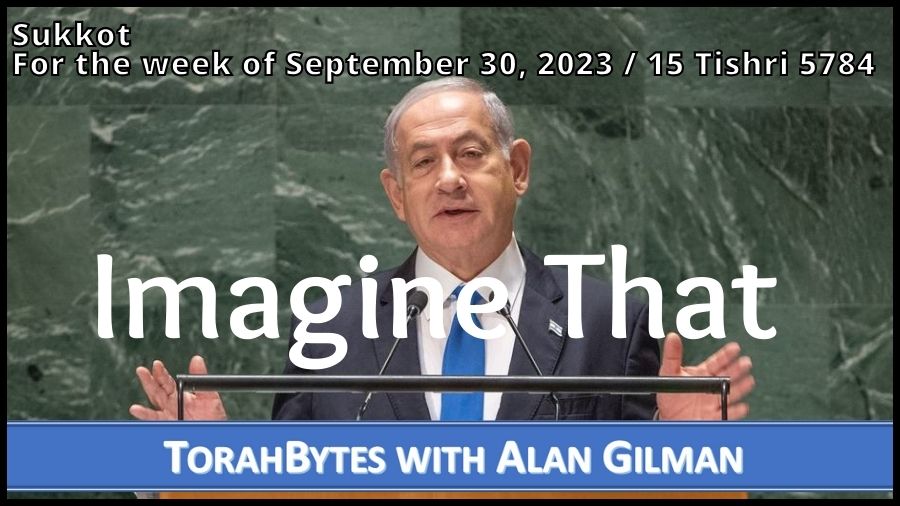For the week of September 30, 2023 / 15 Tishri 5784

Sukkot
Torah: Vayikra/Leviticus 22:26 – 23:24; B’midbar/Numbers 29:12-16
Haftarah: Zechariah 14:1-21
On that day his feet shall stand on the Mount of Olives that lies before Jerusalem on the east, and the Mount of Olives shall be split in two from east to west by a very wide valley, so that one half of the Mount shall move northward, and the other half southward. (Zechariah 14:4)
My wife and I watched Israeli Prime Minister Benjamin Netanyahu’s recent speech to the UN General Assembly. A couple of things stood out to me. There are so many remarkable things about the Land of Israel. One is its strategic location. As Netanyahu said: “You see, the Land of Israel is situated on the crossroads between Africa, Asia, and Europe. And for centuries, my country was repeatedly invaded by empires passing through it in their campaigns of plunder and conquest elsewhere.” Geographically, Israel is a land bridge. Whoever held that relatively small section of land was able to exercise inordinate control of the vast region. However, the Prime Minister was offering Israel’s strategic location, not, as in days of old, for empire, but as a blessing to many. He continued, “But today, as we tear down walls of enmity, Israel can become a bridge of peace and prosperity between these continents.” Such a prospect is certainly in keeping with the very essence of Israel’s Abrahamic call to be a blessing to the nations (see Bereshit/Genesis 12:1-3). I will come back to this shortly.
The other issue that caught my attention was what he had to say about AI (Artificial Intelligence). He began with a warning:
The perils are great and they are before us: the disruption of democracy, the manipulation of minds, the decimation of jobs, the proliferation of crime and the hacking of all the systems that facilitate modern life. Yet even more disturbing is the potential eruption of AI-driven wars that could achieve an unimaginable scale. Behind this perhaps looms an even greater threat, once the stuff of science fiction: that self-taught machines could eventually control humans instead of the other way around.
He then called for the nations of the world to come together to ensure we don’t end up with what he called “an AI dystopia.” I thought that was the end of that subject. Given his great concern, surely the responsible thing would be for the nations of the world to put the brakes on AI, but no. Netanyahu returns to his earlier optimistic tone. Here’s a taste:
We have so much to gain. Imagine the blessings of finally cracking the genetic code, extending human life by decades, and dramatically reducing the ravages of old age. Imagine healthcare tailored to each individual’s genetic composition and predictive medicine that prevents diseases long before they occur.
As he continues with his list of the wonderful potential benefits of AI, he says something of a depth of irony that I am guessing he didn’t catch. With a hint of a smile, he said, “I know this sounds like a John Lennon song,” clearly referring to the song “Imagine.” I am aware that when people think of “Imagine,” they think of it as an anthem of world peace. Here’s the chorus:
You may say I’m a dreamer
But I’m not the only one
I hope someday you’ll join us
And the world will be as one
Not too far from a biblical view of the future, right? But what about the verses? Here are some sample lines:
Imagine there’s no heaven…
Imagine all the people living for today…
Imagine there’s no countries…And no religion too
Imagine no possessions
This is exactly the world that many people are hoping for, believing that herein lies the path to true peace. I won’t take the time to expound upon each one but notice that the first line of the song is “Imagine there’s no heaven.” This is in keeping with another Lennon song from that period, though not as well known, entitled “God,” in which he sang:
God is a concept by which we measure our pain
This song lists all sort of things Lennon didn’t believe in, including magic, the Bible, Hitler, and Jesus. It concludes with nothing but himself and his wife:
I just believe in me
Yoko and me
And that’s reality
I am not for a moment, implying that the Israeli Prime Minister’s reference to “Imagine” means he believed in Lennon’s twisted utopia. In fact, I agree with him that the nations of the world need to take the negative potential of AI seriously and do their best to ensure it’s used for good. Similarly, I pray that his peace initiatives succeed and result in great benefit to as many people as possible. Yet, whatever he may think of the lyrics to “Imagine,” his optimism is naïve at best and seriously misguided at worst.
Netanyahu’s speech (commenting on what he said, as I don’t actually know what he thinks) falls into the age-old humanistic trap, that somehow, if we only get our act together, the world would be paradise. Not only will that not happen, the more we think we can do this on our own, the greater the probability of impending doom.
God’s answer to war, poverty, disease, and death is clearly outlined in this week’s special Haftarah portion for Sukkot (Festival of Booths): the return of the Messiah to Jerusalem. Imagine that!
Scriptures taken from the English Standard Version
Amen to expressing the futility of all man’s efforts to right this world. MARANATHA! Come quickly Lord Jesus, Messiah Yeshua, our only Savior and Hope of the World!